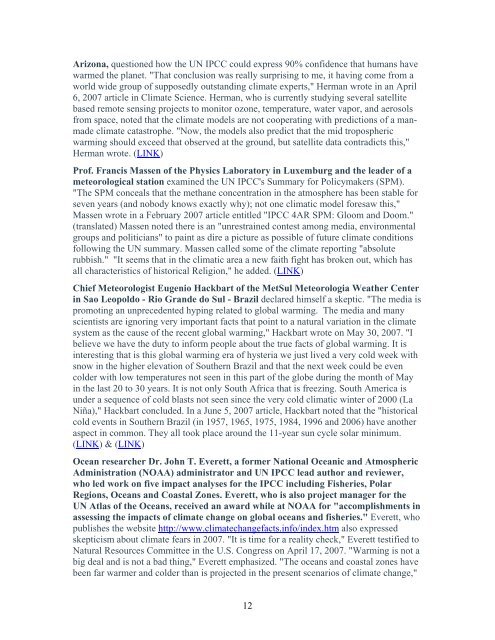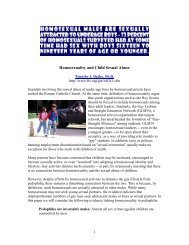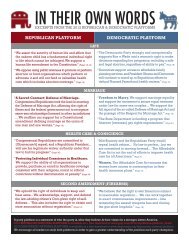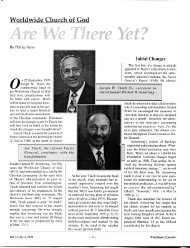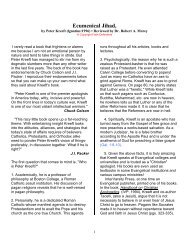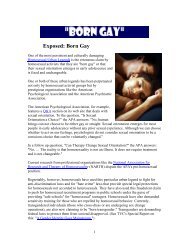U.S. Senate Report: Over 400 Prominent Scientists Disputed ... - NJIAT
U.S. Senate Report: Over 400 Prominent Scientists Disputed ... - NJIAT
U.S. Senate Report: Over 400 Prominent Scientists Disputed ... - NJIAT
Create successful ePaper yourself
Turn your PDF publications into a flip-book with our unique Google optimized e-Paper software.
Arizona, questioned how the UN IPCC could express 90% confidence that humans have<br />
warmed the planet. "That conclusion was really surprising to me, it having come from a<br />
world wide group of supposedly outstanding climate experts," Herman wrote in an April<br />
6, 2007 article in Climate Science. Herman, who is currently studying several satellite<br />
based remote sensing projects to monitor ozone, temperature, water vapor, and aerosols<br />
from space, noted that the climate models are not cooperating with predictions of a manmade<br />
climate catastrophe. "Now, the models also predict that the mid tropospheric<br />
warming should exceed that observed at the ground, but satellite data contradicts this,"<br />
Herman wrote. (LINK)<br />
Prof. Francis Massen of the Physics Laboratory in Luxemburg and the leader of a<br />
meteorological station examined the UN IPCC's Summary for Policymakers (SPM).<br />
"The SPM conceals that the methane concentration in the atmosphere has been stable for<br />
seven years (and nobody knows exactly why); not one climatic model foresaw this,"<br />
Massen wrote in a February 2007 article entitled "IPCC 4AR SPM: Gloom and Doom."<br />
(translated) Massen noted there is an "unrestrained contest among media, environmental<br />
groups and politicians" to paint as dire a picture as possible of future climate conditions<br />
following the UN summary. Massen called some of the climate reporting "absolute<br />
rubbish." "It seems that in the climatic area a new faith fight has broken out, which has<br />
all characteristics of historical Religion," he added. (LINK)<br />
Chief Meteorologist Eugenio Hackbart of the MetSul Meteorologia Weather Center<br />
in Sao Leopoldo - Rio Grande do Sul - Brazil declared himself a skeptic. "The media is<br />
promoting an unprecedented hyping related to global warming. The media and many<br />
scientists are ignoring very important facts that point to a natural variation in the climate<br />
system as the cause of the recent global warming," Hackbart wrote on May 30, 2007. "I<br />
believe we have the duty to inform people about the true facts of global warming. It is<br />
interesting that is this global warming era of hysteria we just lived a very cold week with<br />
snow in the higher elevation of Southern Brazil and that the next week could be even<br />
colder with low temperatures not seen in this part of the globe during the month of May<br />
in the last 20 to 30 years. It is not only South Africa that is freezing. South America is<br />
under a sequence of cold blasts not seen since the very cold climatic winter of 2000 (La<br />
Niña)," Hackbart concluded. In a June 5, 2007 article, Hackbart noted that the "historical<br />
cold events in Southern Brazil (in 1957, 1965, 1975, 1984, 1996 and 2006) have another<br />
aspect in common. They all took place around the 11-year sun cycle solar minimum.<br />
(LINK) & (LINK)<br />
Ocean researcher Dr. John T. Everett, a former National Oceanic and Atmospheric<br />
Administration (NOAA) administrator and UN IPCC lead author and reviewer,<br />
who led work on five impact analyses for the IPCC including Fisheries, Polar<br />
Regions, Oceans and Coastal Zones. Everett, who is also project manager for the<br />
UN Atlas of the Oceans, received an award while at NOAA for "accomplishments in<br />
assessing the impacts of climate change on global oceans and fisheries." Everett, who<br />
publishes the website http://www.climatechangefacts.info/index.htm also expressed<br />
skepticism about climate fears in 2007. "It is time for a reality check," Everett testified to<br />
Natural Resources Committee in the U.S. Congress on April 17, 2007. "Warming is not a<br />
big deal and is not a bad thing," Everett emphasized. "The oceans and coastal zones have<br />
been far warmer and colder than is projected in the present scenarios of climate change,"<br />
12


